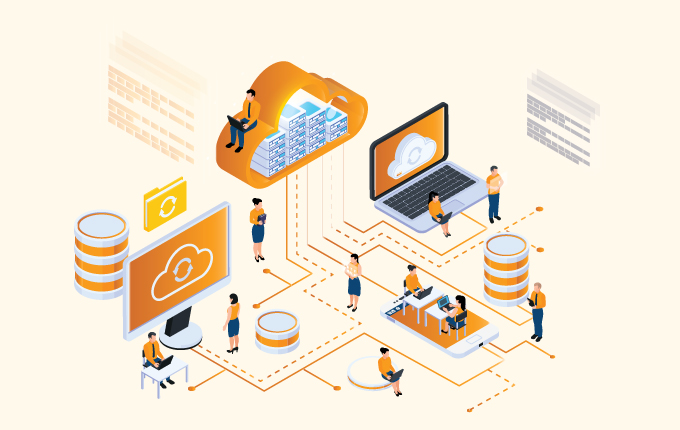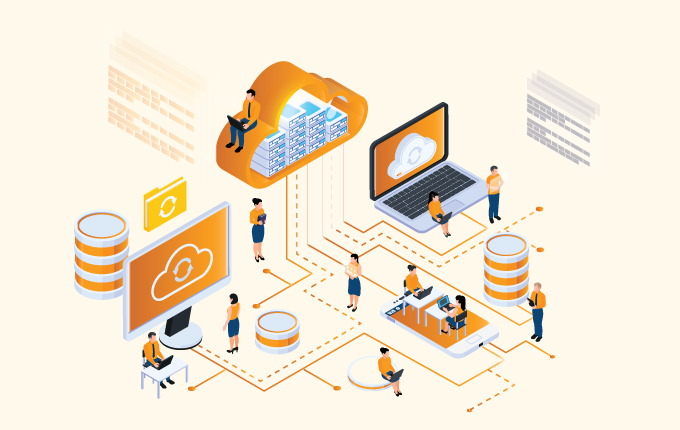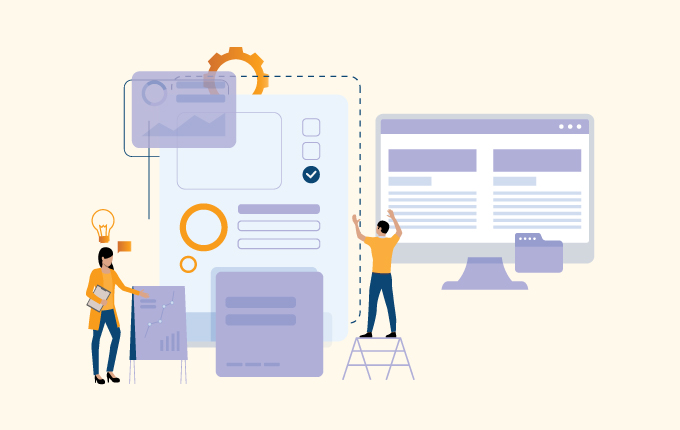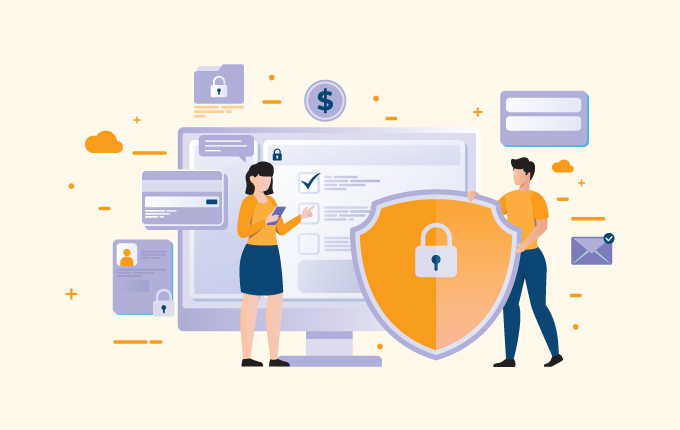Business IntelligenceCloud ServicesIT Consulting & StrategySoftware DevelopmentConstructionEducationFinanceHealthcareLegal
One of the more defining technologies of the last 10 or so years has been the cloud. However, while people have been talking about the cloud and its possibilities for a long time now, it’s only been within the last few years that we’ve seen just how crucial the cloud can be for helping businesses stay competitive in today’s world.
The COVID-19 pandemic showed us how the cloud could help businesses shift and adapt the way they operate, more or less on the fly, to adapt to situations as needed.
The big challenge can be understanding exactly what cloud products or services you need and even how they can help.
How the cloud can help your business

How the cloud helps your business depends on what you’re looking to accomplish. The big perk that everyone noticed early in the pandemic was that cloud tools and services made you incredibly flexible. You weren’t chained to a desk or a specific workstation, so you could easily do the work from home. Let’s explore the other ways the cloud can help your business.
Efficiency of the cloud
Working in the cloud brings a level of interconnectedness that hasn’t been possible until recently. It wasn’t that long ago that if you needed to use three different platforms to accomplish a task, you’d very likely have to cut and paste information manually to do the job. These days, it’s possible to link up just about everything either through native integrations with other software or using services like Zapier that make the connection for you.
This makes it possible to work more efficiently in a way that has never been possible before by eliminating those moments of manual intervention and having to move to a new platform to make it happen.
On top of that, there are more options than ever when it comes to the software you use. It’s entirely possible that the three platforms you used to use could be replaced by a single one.
Cost reduction
The cloud does a really good job of removing infrastructure costs from your business. You no longer need to have a massive server room to power your business, you can move as much of it to the cloud as you’d like to save your business money.
Software licensing tends to be cheaper in the cloud, as well. You’re often not paying a strict per-user license fee as you would have in the past (although sometimes you do), but often you’ll get a block, like up to 50 users for a certain price. This gives you the ability to grow, without immediately having to pay for more licenses.
Uptime improvement
Uptime is a big deal for your business, but being in charge of maintaining it can be a hassle. With cloud platforms, not only are you not responsible for uptime, but you tend to get better service because providers know that if they can’t keep you online, you’re going to go somewhere else.
Most cloud providers will tell you from the start what their uptime looks like and what you can expect if they do experience downtime.
Scalability
The flexibility of the cloud means that your business can use as many resources as needed, when you need them. If you experience a growth spurt, you can scale up in minutes with virtually no effort. If you enter a slow period, it’s no different. The cloud makes it possible to scale the tools you’re using and the server space you’re business needs on a whim.
Understanding your options
Before you run into the cloud and start spending money, you need to understand what you can and can’t do with the cloud. The good news is there’s a service for just about anything you need to be done, you really just have to assess what your needs are and choose the best provider.
DaaS
DaaS stands for desktop as a service. This is similar to virtual machines, but the biggest difference is that virtual machines are self-hosted, where DaaS exists in the cloud and is maintained by the provider.
DaaS is great because it can be quickly set up and customized to suit your workflow. As an outsourced service, you don’t need to worry about downtime or any other support, it’s all managed by the provider.
SaaS
SaaS is probably the most well-known cloud model and there’s a good chance you’re already using at least one SaaS in your business or personal life (like Spotify).
SaaS is software on a subscription basis. Rather than purchasing software, you’re buying access to the service for as long as you need it. In return, you get something that is easily scalable, more secure, and it’s something you don’t have to maintain.
Where SaaS platforms tend to really shine is that they’re almost infinitely interconnectable (as mentioned). If you want your email provider to talk to your accounting software, it’s easy to make that (and similar things) happen.
PaaS
If you’re a developer or have a need for things like complex business intelligence platforms, a platform as a service (PaaS) is for you. PaaS tends to include everything you need from an infrastructure perspective, but also allows you to work with development tools, database management systems, and data gathering and analysis tools.
The most common use for PaaS is running development ecosystems like Kubernetes.
IaaS
Infrastructure as a service (IaaS) is very similar to PaaS, with the most notable difference being that with IaaS you have direct access to the underlying technology you’re using. For example, with PaaS, you’d be running Kubernetes without thinking much about the server it operates on, but with IaaS, you’re managing everything, including the infrastructure.
When to choose what and why
Figuring out exactly what you need is mostly a matter of figuring out where you’re at a business, what external factors impact your business, and looking at where you want to be in the future.
What this means is that if you’re looking for new accounting software, you’re probably not going to need to worry about running the server it operates on. However, you should consider what the future of your business looks like and take that into consideration. If your plans are to move into the financial sector, for example, you need to ensure that anything you use has the necessary regulatory and compliance features in place.
So take a long hard look at your business and think about everything you’re hoping to accomplish. Then, take a moment to think about how prepared you were for the pandemic, which should give you a good sense of what could happen. You’ll want to be sure that you have systems in place to adapt again, should there be a sudden need, as well as focussing on your business goals.
Want to learn more about the cloud?
The good news is that you don’t have to know everything about the cloud. You can rely on the expertise of those who have been working with the cloud from the beginning (like us). We can help you assess your business needs and determine whether you need SaaS, PaaS, or DaaS to fuel your business.
Contact us today to learn more.



 March 2, 2022
March 2, 2022 Homefield IT
Homefield IT

